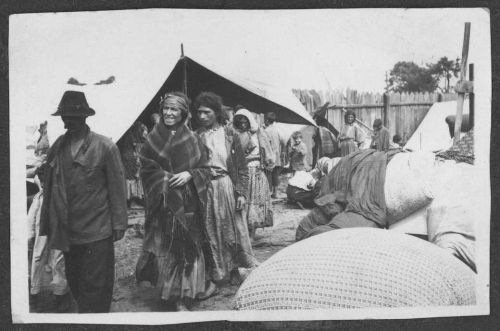Roma- Sinti- Account by Martha W. Hamburg to Belzec

Belzec - Women in the Gypsy Camp (Regional Museum Tomaszow Lubelski)
Martha W. a Sinti woman, born in Kiel, Germany during 1921, was deported to Belzec together with her two children, her mother, and her brother. After the Second World War she recounted her story in an interview with Karin Guth, which is incredibly moving and heart-rending:
In May, I think it was 16 May 1940, they came for us and brought us to the Fruchschuppen (Fruit Warehouse) in the harbour of Hamburg. My memory is not that good anymore. I only know that a lot of people were in the warehouse. It was like being in an anthill, so many people were running around.
We were registered and those above the age of fourteen received a number on the arm, this was not tattooed, as was later the case in Auschwitz, but stamped in ink. The number faded after a few days. I cannot remember how many days we were in the warehouse. Not many perhaps three days. Quite nearby, only some steps away , we were ordered to enter goods wagons at the Hannoverscher Station.
There was an awful confusion, there being hundreds of people. We were told we were being transported to Poland, where we would receive a nice little house. And they told me that my father was already there, but we were deceived.
When we arrived at our destination SS surrounded the train. They were there at our arrival and drove us out of the wagons. Policemen had accompanied us, two to a wagon (probably within the brakers cabin at the rear of some wagons). We naturally did not travel without a guard. They knew we would have otherwise simply left the train and escaped. We would have done this had we had the chance. The policemen who had escorted us, appeared thoroughly sheepish, when they saw the SS and heard the SS commandant, a small man standing there with a whip in his hand; immediately shouting , 'if you don't obey the orders! Oh dear and the rest he said. He called us dogs and we were treated as such. That was so awful. The policemen from Hamburg stood there speechless. I presume they hadn't known what we to experience in Belzec.
Then we had to walk to a large barn, that was more a very large shed. There was only old straw on the floor. We had to enter this shed, SS guards were posted outside. Today I no longer remember how long we were in that Belzec camp. It was summer when we arrived. I think we were there for some weeks. It was awful there. One could not wash oneself, there were no toilets. We were all crammed together.
We were immediately set to work, in a work column. We had to dig tank ditches. There were many Jews in Belzec too. They were housed in the same shed as us and also worked in the column. They usually only remained for some weeks, then they were transported from Belzec to somewhere else.
The food was awful. A Roma was detailed to cook for us all. The SS shot crows and ravens and simply threw them into the large pot. The man didn't want to cook the birds without first plucking the feathers. They beat him so badly that the blood ran out the bottom of his trousers.
One day those of us with children had to line up because the children were to receive something special to eat. I had two children. My daughter was two and my son was one-year old. Each was given a bowl containing milk with bread crumbled in it. Or so it appeared. This was especially for the children. Well one child after the other died over the following days. There was such lamenting, lamenting and crying. Shortly after having eaten, the children were unable to breathe anymore, they asphyxiated. My little boy died first. Someone woke me in the morning. I was woken because the child had kicked and the person wanted to cover him again. So I awoke and went to pick him up. He was already quite stiff. I was devastated with grief and I didn't know what to do. My cousin, the sister of Mrs B. lifted him and a big clot of pus came out of his throat. All the children experienced this. My two-year old daughter died in the same way the next day. They had been poisoned.
One day we had to enter cattle wagons again, in Belzec. There was just a bare floor. There were no windows, only air slits, high up. There were no toilet facilities. We had to enter that train, not knowing what to expect. Nobody told us anything. We were taken to Krychow. We traveled through the night in this cattle wagon. When we arrived at the station, horse-drawn vehicles awaited us, that took us to the camp. It was a former Polish prison, far away from the station. We were guarded by men wearing a black uniform. They were Volksdeutsche. These Volksdeutsche and SS were everywhere.
Sources
Interview with Karin Guth, 2005, www.deathcamps.org
Photograph: Regional Museum Tomaszow Lubelskie
© Holocaust Historical Society April 21, 2020

